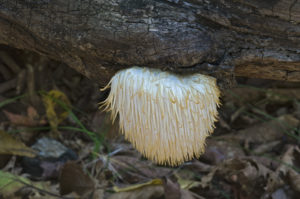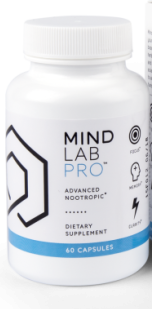Table of Contents
Lion’s Mane (Hericium erinaceus) is unique in the mushroom family both in appearance and function. Lion’s Mane Mushroom is extremely effective at stimulating Nerve Growth Factor (NGF) in the brain.
Known for its powerful effects as a “brain tonic”, Lion’s Mane is said to have been used as a tea for thousands of years by Buddhist monks. To enhance brain power, and heighten their ability to focus during meditation.
Lion’s Mane as a nootropic, is a powerful catalyst for brain cell regeneration helping improve memory and cognition.
The primary active compounds in Lion’s Mane are hericenones and erinacines. Erinacines help your brain produce more Nerve Growth Factor. Erinacines easily cross the blood-brain barrier to boost the production of neurons.
Lion’s Mane helps:
- Nerve Growth Factor. Lion’s Mane Mushroom prevents and treats nerve damage in the brain. Once past the blood-brain barrier, Lion’s Mane stimulates enzyme production that release Nerve Growth Factor (NGF). Nerve regeneration helps relieve neurodegenerative disease symptoms such as Alzheimer’s, dementia, and Parkinson’s Disease.
- Neurogenesis. Lion’s Mane stimulates the repair and creation of neurons. Boosting neurotransmitters and signaling that effects memory, learning, recall, and mood.
- Brain Optimization. Lion’s Mane helps eliminate brain fog. Restoring memory and mental alertness. And improves anxiety and depression symptoms.
Overview
Lion’s Mane (Hericium erinaceus) is a medicinal mushroom proven to benefit the brain, nerves and immune system.
Unlike other mushrooms sporting a cap and stem, Lion’s Mane has long, flowing, white tendrils. Resembling a lion’s mane. Other names include Monkey’s Head, Bearded Tooth, Pom Pom Blanc, Hedgehog Mushroom and Satyr’s Beard.

This parasitic fungus grows hanging off logs and trees. And is native to North American, Europe and Southeast Asia. In Japan, it’s called yamabushitake or “those who sleep in mountains”. Referring to the Shugendo sect of hermit monks and their long, flowing robes.
As a nootropic, Lion’s Mane has been shown to be particularly effective in stimulating Nerve Growth Factor (NGF) in the brain.
NGF is produced in the hippocampus throughout life. Modulating cholinergic receptors and neuroplasticity.[i] And is essential for learning.
Nerve Growth Factor are special proteins that function to regenerate neurons. Lion’s Mane contains two unique classes of NGF’s – hericenones and erinacines which easily cross the blood-brain barrier.
Lion’s Mane, like other medicinal mushrooms, contain high amounts of the antioxidant beta-glucoxylan and four other polysaccharides and polypeptides. Having a significant impact on enhancing your immune system. And decreasing tumor growth.
Lion’s Mane has also been studied in reducing amyloid plaques. These clumps of beta-amyloid proteins block signals between neurons. And are implicated in Alzheimer’s and other neurodegenerative diseases.
Lions’ Mane is also used to treat Lyme’s Disease, and digestive tract issues.
Here we’re talking about Lion’s Mane Mushroom and its effects on brain health and chemistry.
How does Lion’s Mane Work in the Brain?
Lion’s Mane boosts brain health and function in several ways. But two in particular stand out.
- Lion’s Mane Mushroom stimulates the synthesis of Nerve Growth Factor (NGF). NGF is a protein that plays a major role in the maintenance, survival and regeneration of neurons.
NGF is required by your brain to keep neurons strong and healthy. When various neurological disorders occur, your brain is unable to produce its own internal source of NGF.
In a study done in Kuala Lumpur in 2013, scientists showed that Lion’s Mane extract induced NGF synthesis and promoted neurite outgrowth.[ii]
- Lion’s Mane is effective in reducing anxiety and depression. Some even call it the “smart mushroom” for its ability to improve cognition, memory and work as an anti-depressant.
A study by researchers in Japan worked with 30 women. The female subjects had been complaining about menopause, depression, sleep quality and other issues.
The women randomly received Lion’s Mane-laced cookies or a placebo for 4 weeks. The researchers found that Lion’s Mane “has the possibility to reduce depression and anxiety, and these results suggest a different mechanism from NGF-enhancing action of H. erinaceus”. [iii]
How things go bad
Science once believed that the brain could not grow new brain cells. That once our brain developed during childhood, and we reached adulthood, we had all the brain cells we’d ever have.
Now we know that neurons can regenerate. But that doesn’t mean they will regenerate. A number of health issues can contribute to neurodegeneration.
↓ Decrease in Nerve Growth Factor = Decrease in Long-Term Potentiation affecting long-term memory[iv]
↓ Brain cells die and are not replaced
↓ Neuroplasticity declines resulting in poor memory
↓ Neurotransmitters decline resulting in anxiety, poor mood and depression
All of these age-related changes are contributing factors to neurodegenerative diseases like Alzheimer’s, Parkinson’s and others. And anxiety, depression and mood disorders that affect quality of life.
Lion’s Mane benefits
At least a dozen peer-reviewed studies have been published on Lion’s Mane benefits to brain health since 1991. Dr. Kawagishi of Japan was first to identify Nerve Growth Factor properties in Lion’s Mane Mushroom.[v]
In one double-blind, placebo-controlled trial, researchers in Japan worked with 50 – 80 year old men and women. All suffered from mild cognitive impairment.
The trial subjects received four 250 mg tablets containing 96% of Yamabushitake (Lion’s Mane) dry powder three times a day for 16 weeks. The men and women were tested at 4, 8, 12 and 16 weeks.
At each of the testing periods, the subjects who had used Lion’s Mane showed a significant improvement in cognitive scores. And their scores were increasing while on Lion’s Mane supplementation. But 4 weeks after stopping Lion’s mane supplementation, their cognitive scores decreased significantly.
The researchers concluded that Lion’s Mane Mushroom is effective in improving mild cognitive impairment.[vi]
How does Lion’s Mane feel?
You may not experience the effects of supplementing with Lion’s Mane Mushroom immediately. But many users report with continued use of Lion’s Mane, a boost in mood and mental energy.
 Some report it increases depth perception. And an improvement in sense of smell.
Some report it increases depth perception. And an improvement in sense of smell.
Others testify to improved decision-making, the ability to solve problems and learning. Likely due to Lion’s Mane ability to improve neuroplasticity.
The overall consensus is Lion’s Mane Mushroom’s ability to lessen anxiety, reduce depression, and improve concentration.
Lion’s Mane Clinical Research
Lion’s Mane Mushroom has been used as a food and herbal medicine since ancient times in East Asia. And it has been reported in scientific research that Lion’s Mane promotes Nerve Growth Factor both in the petri dish as well as in animal and human test subjects.
Lion’s Mane Prevents Cognitive Dysfunction
In this study, researchers examined the effects of Lion’s Mane on amyloid β(25-35) peptide-induced learning and memory deficits in mice. Amyloid β(25-35) peptide is implicated in diseases like Alzheimer’s.
Mice were injected with the peptide on days 7 and 14 of the trial. And they were fed a diet containing Lion’s Mane over 23-days of the experiment. The results showed that Lion’s Mane prevented short-term and visual recognition memory reduction normally induced by amyloid β(25-35) peptide.
They concluded that Lion’s Mane Mushroom “may be useful in the prevention of cognitive dysfunction”.[vii]
Lion’s Mane Induces Nerve Growth Factor
In this trial, mice were fed Lion’s Mane 5% freeze-dried powdered extract for 7 days. Researchers found an increase in the level of Nerve Growth Factor (NGF) in the hippocampus of the mice. Concluding that Lion’s Mane “contains active compounds that stimulate NGF synthesis”.[viii]
Lion’s Mane Repairs Nerves
In this study done with rats, Lion’s Mane extract was able to promote neuron regrowth after injury. Rats with gluteal nerve damage were able to walk again after consuming water containing Lion’s Mane extract.
The researchers concluded that Lion’s Mane regenerates damaged nerve cells. In this case, the reversal was so profound, the rats went from being totally disabled to walking again.[ix]
Lion’s Mane Dosage
Wondering how much Lion’s Mane to take? Dosing of Lion’s Mane Mushroom depends on the strength of the extract.
For Lion’s Mane 10:1 extract (30% polysaccharide), daily dosage is 500 – 1,000 mg taken 1 to 3 times per day. This means that if you choose a daily dose of 1,000 mg of Lion’s Mane extract, you should take 500 mg in the morning, and another 500 mg at noon.
Other retail extract dosage of Lion’s Mane ranges from 300 mg to 3000 mg dosed 1 – 3 times per day. Check the label and see what the manufacturer recommends. And when first using the supplement, start with the lowest dose and see how your body reacts.
Lion’s Mane Side Effects
Lion’s Mane Mushroom is non-toxic and considered very safe. So there are very few side effects reported.
Some neurohackers report itchy skin from higher doses. Likely attributable to a boost in Nerve Growth Factor.
Lion’s Mane has been tested in animals showing no side effects or toxicity even up to 5 grams per kilogram.
Best type of Lion’s Mane to buy
Lion’s Mane Mushroom (Hericium erinaceus) as a nootropic supplement is usually offered as an extract. In powdered form, or in a capsule.
 Lion’s Mane Mushroom can be found in some of higher quality pre-formulated nootropic stacks. For example, Click for Mind Lab Pro® contains 11 brain enhancing nootropic compounds including Lion’s Mane with the full fruit spectrum including hericenones and erinacines.
Lion’s Mane Mushroom can be found in some of higher quality pre-formulated nootropic stacks. For example, Click for Mind Lab Pro® contains 11 brain enhancing nootropic compounds including Lion’s Mane with the full fruit spectrum including hericenones and erinacines.
I recommend Mind Lab Pro® because it addresses all aspects of anxiety resistance, memory and cognitive enhancement, stabilizes mood, brain repair, and maintenance.
This premium nootropic stack is designed to affect neurotransmitters, cognitive energy, brain waves, neuroprotection, and regeneration. See my Mind Lab Pro review for a detailed report.
When choosing a Lion’s Mane supplement, there’s debate over the best form of extraction to achieve the mushroom’s full medicinal benefit. Some say your best option is a hot water extraction. Another says alcohol extraction. Another claims both are necessary.
But when it comes to mushrooms, saying that one is “more potent” than another is just too simplified to be true. This is as much an art as it is science.
Much more important is choosing a supplement that includes the mycelium of Lion’s Mane Mushroom. In this mushroom, the fruiting body does not contain erinacines which is the compound that boosts Nerve Growth Factor (NGF).
The nootropic benefits of hericenones only found in the fruiting body or top of the mushroom help support your immune system and get rid of Amyloid β(25-35) peptide implicated in diseases like Alzheimer’s.
The challenge is getting a Lion’s Mane Mushroom extract that contains the full spectrum found in both the mycelium and fruiting body. But the mushroom must be grown in liquid and not a solid substrate like grain. Otherwise you’ll get ground up grain without the important erinacines needed for increased NGF.
Look at the manufacturer’s literature and marketing material and find out how their Lion’s Mane is grown. And read the reviews on shopping sites as well as forums.
Types of Lion’s Mane available:
- Plain Lion’s Mane: Pure, powdered mushroom. Often freeze-dried, and the cheapest form available. Can be added to water, juice or smoothies.
- Lion’s Mane Extracts: A more potent form of mushroom. Often presented as 14:1 or 10:1 extracts (14 pounds or 10 pounds reduced to 1 pound of extract).
You will get 500 mg Lion’s Mane full spectrum extract in Click for Mind Lab Pro®
If you want a standalone Lion’s Mane Extract, I recommend Real Mushrooms organic Lion’s Mane Extract
- Standardized Lion’s Mane: Processed to provide exact levels of active ingredients. You can get Lion’s Mane standardized to 30% and 50% polysaccharides (including the active secondary metabolites hericenones and erinacines).
- Lion’s Mane tea: Since this is a popular mushroom in the kitchen, the taste is acceptable. But it’s hard to get a handle on how much actual active ingredient you’re getting.
- Amycenone®/PLM-Fraction: This “branded” product is standardized to Hericenones 0.5%, Amyloban 6%. It seems to target a lesser-known Lion’s Mane active ingredient–Amyloban–which is positioned as a mushroom compound that fights beta-amyloid proteins. Originating in Japan, it is extremely expensive, and may be found in a supplement called Amyloban®3399.
And if you decide to pick your own, before consuming any wild mushroom, make sure that it is accurately identified. Mushroom poisoning is a real problem if you pick the wrong one.
For a full list of Mycology societies that may be able to help you, go to the North American Mycological Association website (www.namyco.org).
Nootropics Expert Recommendation
Lion’s Mane 500 – 2,000 mg per day
 I recommend using Lion’s Mane as a nootropic supplement.
I recommend using Lion’s Mane as a nootropic supplement.
Your body does not make Lion’s Mane on its own. So you need to take it as a supplement.
Lion’s Mane is especially helpful for regenerating brain cells. It prevents neurodegenerative diseases like Alzheimer’s and Parkinson’s.
And it boosts long-term potentiation for memory and mental sharpness. By stimulating Nerve Growth Factor.
Lion’s Mane also helps boost mood, tame anxiety and relieve depression. For a better quality of life.
We suggest starting with a dose of 500 mg daily. The best human study used 3000 mg per day. But another researcher found lower concentrations may stimulate NGF better than higher concentrations.[x]
Start at 500 mg per day and see how it works for you. If you don’t experience a benefit, boost Lion’s Mane in small increments of 250 mg per day until you notice an improvement. And make sure you are using a supplement containing the mycelium and fruiting body that is grown in a liquid medium.
You can buy individual Lion’s Mane supplements. Or you could try my favorite pre-formulated nootropic stack Click for Mind Lab Pro® which includes the full spectrum including hericenones and erinacines found in Lion’s Mane Mushroom.
Mind Lab Pro contains a synergistic blend of 11 brain enhancing nootropics covering all aspects of cognition and brain health. See my full Mind Lab Pro review for more.
Lion’s Mane is a great compliment to a nootropic stack including Aniracetam, Alpha GPC and Omega-3’s for an immediate cognitive boost.








Join The Discussion - 408 comments
Mike Kaminski
February 9, 2020
Is it ok to take with bacopa?
David Tomen
February 9, 2020
Yes
May
February 5, 2020
Can a product be taken by a child of 12 years with autism Is it safe?
David Tomen
February 5, 2020
May, I’ve not seen anything to show there would be a problem. Try doing a general Internet search for [“autism” AND “Lion’s Mane”] and see if anything turns up. Use that exact phrase that is inside the brackets.
Peter
January 22, 2020
What an excellent resource you have created at this website David. I want to say I appreciate your time and effort, as well as generosity answering questions. Peter.
Matty P
January 20, 2020
Hi David,
Thanks for the informative write up, I have a question I think you could help with.
Ive been taking 500mg of lions mane every morning for the last 2 months, its helped me with mild depression and stress and i feel like a different person which is amazing. But since Ive been taking it ive had a craving which i cant pinpoint, its quite intense and I cant figure out what it is, wether its glucose or a mineral/vitamin. Also the first month i felt great! I started running and had loads of energy throughout the day but Ive noticed my fitness declining no fatigue in my normal day but mainly stamina during exercise? like if you hadnt eaten enough food or something, but i am eating enough calories. Is there anything else you should be taking with lions mane if you are taking it daily? Ive read some people take creatine?
Thanks for your help!
David Tomen
January 21, 2020
Matty, this is not a normal side effect of using Lion’s Mane. It’s possible the supplement you are using has something else that you are not aware of. What brand are you using and do they guarantee their testing program?
matt p
January 22, 2020
Thanks for the reply, Im also taking vit c & iron, Vit D and curcumin. ive stopped them and going to add each one to see what it is whats causing it.
Regards,
Matt.
Yildiz
January 8, 2020
Hi David,
You write “the active hericenones and erinacines are metabolites of polysaccharides” but this is not the case, sorry.
Polysaccharides are water-soluble carbohydrates (sugars) and some of them are bioactive (beta-glucans).
Hericenones and erinacines however are not carbs but alcohol-soluble terpenoids. They will only be present in an alcohol-extracted Lion’s Mane supplement, not in the more common water extracts optimised for polysaccharides or beta-glucans.
David Tomen
January 11, 2020
Yildiz, you’re likely technically correct. But when making a statement like this it’s helpful to provide clinical evidence or some kind of “scientific proof” of what you are stating. Would you please provide evidence of what you wrote?
Yildiz
January 14, 2020
Polysaccharides: wikipedia explanation: https://en.wikipedia.org/wiki/Polysaccharide
Beta-glucan: wikipedia explanation:
https://en.wikipedia.org/wiki/Beta-glucan
Below is an article describing the NGF-inducers in Lion’s Mane:
https://www.tandfonline.com/doi/full/10.1080/21501201003735556
Take care !
David Tomen
January 15, 2020
Yildiz, thank you for responding. I consider the Mycology Journal that you linked to as an authority. But not Wikipedia. Possibly some of the clinical studies linked to in each Wikipedia article but not the Wiki article itself.
Yildiz
January 16, 2020
The wikipedia articles are well referenced so I’d say they’re trustworthy.
That aside, in this case the subjects (polysaccharides, beta-glucans) are very basic. It is not advanced science, a simple Google search would give 1000s of similar results.
Zarathustra owens
July 12, 2020
the gentleman is correct. you will find very enhanced neurotic properties by FERMENTING lions mane, using yeast. this produces about 1-2% alcohol if done correctly, but also extracts what is mentioned. in archeological evidence this works in beer, hence the banning of fermented mushrooms in the german purity laws.
Greg Lake
December 18, 2019
Before finding your guide, I have been trying Lion’s Mane 500 mg capsules. After taking it in the morning, around 4PM, I get extremely tired/sleepy and nap for up to 2 hours. This does not happen if I do not take the capsule. Could this be caused by the Lion’s Main and a deficiency of Choline?
David Tomen
December 18, 2019
Greg, there’s nothing in Lion’s Mane that could cause that type of side effect. Unless there was something else in that capsule that shouldn’t have been in there.
Mick
December 15, 2019
OK Thanks David
Mick
December 15, 2019
I mean if it’s 1000mg per capsule, if I’ll take two capsules a day is it too much?
Thanks David
David Tomen
December 15, 2019
Mick, for Lion’s Mane 10:1 extract (30% polysaccharide), daily dosage is 500 – 1,000 mg taken 1 to 3 times per day. So according to my research you are good up to 3 grams per day of Lion’s Mane extract.